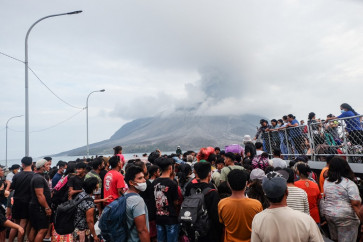Cheaper oil eases pressure on govt fuel-subsidy bill
Recent drops in the worldâs crude oil prices have significantly eased pressures on the governmentâs bill on fuel subsidies, which are estimated to reach Rp 276 trillion (US$22
Change Size

R
ecent drops in the world's crude oil prices have significantly eased pressures on the government's bill on fuel subsidies, which are estimated to reach Rp 276 trillion (US$22.9 billion) next year.
However, analysts have warned that President Joko 'Jokowi' Widodo should not backtrack on his plan to raise the price of subsidized fuel, despite the benefits from the drop in the world's crude-oil prices.
The price of benchmark Brent crude oil has fallen by more than 25 percent over the past four months, trading at $85.8 per barrel on Tuesday, according to Bloomberg.
That was significantly below the average price predicted by the government in the 2015 state budget, which assumes the Indonesian crude price (ICP) at $105 per barrel. The ICP is traded not far from the price set for the benchmark Brent oil.
'If crude-oil prices were to remain lower for longer, then Indonesia's equity markets are likely to benefit the most,' analysts from Morgan Stanley wrote in a note released on Tuesday.
'Reduction in crude-oil prices could alleviate Indonesia's multiple macro vulnerabilities ' namely, twin deficits and tight domestic liquidity,' the analysts argued. 'It would provide a further extended window for the new government to reform, as macro pressures would be alleviated to a certain extent.'
The US-based investment bank predicted the global oil price might average around $90 per barrel for some time. Every 10-percent fall in oil prices would reduce Indonesia's fuel-subsidy expenditure by 0.4 percent of gross domestic product (GDP), according to Morgan Stanley.
Indonesia's total expenditure on fuel subsidies is estimated to hit Rp 276 trillion next year, around 15 percent of state spending.
Jokowi, who assumed leadership of Southeast Asia's largest economy this week, has pledged to completely eliminate the fuel subsidies in four years, planning to reallocate the funds to growth-generating infrastructure projects. One of his presidential campaign pledges was to spur economic growth to 7 percent, a level that was last achieved prior to the 1997-1998 financial crisis.
The new President might increase the price of subsidized Premium gasoline by Rp 3,000 per liter ' or 46 percent of its current price of Rp 6,000 ' as early as November, his economic advisers have said.
However, increasing the price of subsidized fuel is deeply unpopular in Indonesia, a former oil-exporting country that has been accustomed to cheap fuel prices for decades, with previous efforts being met with protests or violent rallies.
'From an economic standpoint, subsidies create inefficiencies and are a burden on government finances,' researchers from Capital Economics wrote in a note distributed to clients on Monday.
'Subsidy reform is also being seen as a test of the new leader's commitment to market-friendly reforms,' the UK-based research firm argued. 'In Indonesia, early progress on cutting fuel subsidies may help to persuade critics that Jokowi is the man to get the economy back on track.'
Falling global oil prices were not a reason to backtrack from undertaking reform on fuel subsidies, former finance minister Chatib Basri said in a discussion with journalists last week.









